#completion list
Photo

Jon Bois: 20020
This guy is a dumbass.
yeah he rules
For as much fun as I had with 17776, there are some significant flaws at play. That story is about its protagonists interrogating an essentially static world until they embrace it, conceding that an eternity of play is better than just about anything anyone else could come up with. As such, it kind of overstays its welcome, spending too long driving its point home.
As such, I was surprised to hear that there was a sequel, 20020, focused exclusively on college football in the eternal, post-scarcity America. If 17776 exhausted its material before it was itself even over, how could 20020 possibly find something new to say?
Friends, 20020 is much better, much more exciting, and much more tense.
I don't know that I would go so far as to say it could be read as a standalone, but this is the best version of the world Bois imagined.
Shortly after the events of 17776 (just a few centuries, really) the eternally young, football-obsessed people of the United States devise a new structure for college football: by drawing lines from each endzone of their stadium until that line hits a national border or ocean, they create a network of school territories criss-crossing the nation. Each school starts with one football. If any team can gather all of the footballs by marching onto their opponents' stretched field and forcing a turnover, they are the national champion.
Husbands Manny and Nick live together in a nice apartment in Atlanta. They have a happy life, an All-American love story. One day, however, the two make the discovery of a lifetime.
And, in a world where no one can die, that's an incredible thing to say.
You see, Manny and Nick are football players. They play for San Diego State, perhaps the only two real San Diego State players left in the country. Their apartment is on the elongated field of Georgia State— meaning they have never stopped playing. And they have just discovered where Georgia Tech keeps all nine of their battle-won footballs. If they can somehow get these balls all the way from Atlanta to San Diego, it will be the greatest shift in the game in centuries. Between them and home are thousands of miles and thousands of hostile college footballs players. To pull this off would be a true Odyssey.
20020 is, in a sense, a form of procedural storytelling. By starting with this central premise— what if a college football field was extended as far is it could possibly go? (an idea which has returned in a number of Bois stories, from The Tim Tebow CFL Chronicles to 17776 to even a form of the concept in The History of the Atlanta Falcons), Bois then reads the thousand-miles long pick-up sticks like they're tea leaves and searches for stories to tell, relying on the power of coincidence to imagine what this world would be like. For example, did you know that San Diego State is the one school in the country whose line would not intersect with any other DI school? Did you know that Alabama-Birmingham shares a line with a lighthouse on the Great Lakes? Did you know that the lines of Georgia Tech and Michigan State almost— but not quite— touch in Tennessee?
All of these seemingly extraneous facts, these geographic curiosities, become essential tactical facts in this universe. Bois takes this coincidence-hunting one step further by taking his map and steeping it in the facts and curios of Americana. For example, that spot in Tennessee where the lines almost— but not quite— touch? Did you know that there was a runaway train there in 1910?
Did you know that the intersection of those facts is going to make your heart stop partway through 20020?
By taking these geographic oddities, choosing what stories to tell around them, and relying on our nigh-spiritual need to connect ourselves to the people who once tread these same spots, Bois has procedurally crafted a compelling American road trip novel.
If there's one criticism to be levied, it's that we don't get a full experience here. We get a riveting action scene to end 20020, but the story's not over yet. Part of how we remember 20020 is going to be how we feel about 20021, now two years delayed. I hope we get to see it, because I'm now really invested in this impossible journey of Manny and Nick.
#completion list#books#completed#todo#review#20020#jon bois#17776#science fiction#sci-fi#speculative fiction#sports#comedy#football#college football
24 notes
·
View notes
Text
the fact that shakespeare was a playwright is sometimes so funny to me. just the concept of the "greatest writer of the English language" being a random 450-year-old entertainer, a 16th cent pop cultural sensation (thanks in large part to puns & dirty jokes & verbiage & a long-running appeal to commoners). and his work was made to be watched not read, but in the classroom teachers just hand us his scripts and say "that's literature"
just...imagine it's 2450 A.D. and English Lit students are regularly going into 100k debt writing postdoc theses on The Simpsons screenplays. the original animation hasn't even been preserved, it's literally just scripts and the occasional SDH subtitles.txt. they've been republished more times than the Bible
#due to the Great Data Decay academics write viciously argumentative articles on which episodes aired in what order#at conferences professors have known to engage in physically violent altercations whilst debating the air date number of household viewers#90% of the couch gags have been lost and there is a billion dollar trade in counterfeit “lost copies”#serious note: i'll be honest i always assumed it was english imperialism that made shakespeare so inescapable in the 19th/20th cent#like his writing should have become obscure at the same level of his contemporaries#but british imperialists needed an ENGLISH LANGUAGE (and BRITISH) writer to venerate#and shakespeare wrote so many damn things that there was a humongous body of work just sitting there waiting to be culturally exploited...#i know it didn't happen like this but i imagine a English Parliament House Committee Member For The Education Of The Masses or something#cartoonishly stumbling over a dusty cobwebbed crate labelled the Complete Works of Shakespeare#and going 'Eureka! this shall make excellent propoganda for fabricating a national identity in a time of great social unrest.#it will be a cornerstone of our elitist educational institutions for centuries to come! long live our decaying empire!'#'what good fortune that this used to be accessible and entertaining to mainstream illiterate audience members...#..but now we can strip that away and make it a difficult & alienating foundation of a Classical Education! just like the latin language :)'#anyway maybe there's no such thing as the 'greatest writer of x language' in ANY language?#maybe there are just different styles and yes levels of expertise and skill but also a high degree of subjectivity#and variance in the way that we as individuals and members of different cultures/time periods experience any work of media#and that's okay! and should be acknowledged!!! and allow us to give ourselves permission to broaden our horizons#and explore the stories of marginalized/underappreciated creators#instead of worshiping the List of Top 10 Best (aka Most Famous) Whatevers Of All Time/A Certain Time Period#anyways things are famous for a reason and that reason has little to do with innate “value”#and much more to do with how it plays into the interests of powerful institutions motivated to influence our shared cultural narratives#so i'm not saying 'stop teaching shakespeare'. but like...maybe classrooms should stop using it as busy work that (by accident or designs)#happens to alienate a large number of students who could otherwise be engaging critically with works that feel more relevant to their world#(by merit of not being 4 centuries old or lacking necessary historical context or requiring untaught translation skills)#and yeah...MAYBE our educational institutions could spend less time/money on shakespeare critical analysis and more on...#...any of thousands of underfunded areas of literary research i literally (pun!) don't know where to begin#oh and p.s. the modern publishing world is in shambles and it would be neat if schoolwork could include modern works?#beautiful complicated socially relevant works of literature are published every year. it's not just the 'classics' that have value#and actually modern publications are probably an easier way for students to learn the basics. since lesson plans don't have to include the#important historical/cultural context many teens need for 20+ year old media (which is older than their entire lived experience fyi)
23K notes
·
View notes
Text
happy friday the 13th here are some spooky text-based games for halloween:
contrition - As a priest, it’s your job to listen to your parishioners’ darkest secrets and absolve their guilt. But when a sinister stranger comes to the confessional one Halloween night, you realize it’s your soul on the line.
familiar - You are a familiar. Your mistress has some requests for you. Help her complete her ritual, or pay the price of failure.
jagged bone - A branching choose-your-own-adventure horror game about transformation and perspective.
the forest of candles (and the man with a lighter) - follows Maggie, a young woman with a fear of forest fires sparked by an old town folk tale. She's spent years trying to escape her hometown and the fear it inspires in her, only to be called back for the funeral of an old friend.
mary's hare - Mary's Hare is short interactive horror story about a woman and a rabbit, based on the story of Mary Toft.
only this - "And his eyes have all the seeming of a demon's that is dreaming / And the lamp-light o'er him streaming throws his shadow on the floor..."
what girls do in the dark - a slumber party text adventure.
god is in the radio - you are death, one of 22 members of the major arcana, a cult dedicated to some far-off god. the night is halloween, and you watch in scorn as the unknowing dance among devils and dress to indulge in sin. the high priestess receives a message from the all-mighty himself: the arcana must gather in an abandoned house and find his song on an old radio receiver.
anchorhead - Travel to the haunted coastal town of Anchorhead, Massachusetts and uncover the roots of a horrific conspiracy inspired by the works of H. P. Lovecraft. Search through musty archives and tomes of esoteric lore; dodge hostile townsfolk; combat a generation-spanning evil that threatens your family and the entire world. (illustrated version on itch.io)
my father's long, long legs - An interactive horror story about family, unease, and loss.
beneath floes - Qikiqtaaluk, 1962. The sun falls below the horizon and won't return for months. You wander the broken shoreline, wary of your mother's stories about the qalupalik. Fish woman, stealer of wayward children: she dwells beneath the ice.
the silence under your bed - An interactive horror collection about the strange, the spooky, and the macabre.
bogeyman - You can go home when you learn to be good.
#god is in the radio and what girls do in the dark can be considered VNs i guess#i've played all of these except for anchorhead bc im bad at IF games like that lmfao#i played bogeyman a few days ago and im still thinking about it....#sorry i just love making lists. i tried to go for a strictly halloween vibe#and keep them completely text based this time#games#interactive fiction
6K notes
·
View notes
Text
trans women are not listened to because any connection to femininity makes their viewpoints "less valuable" by misogynists
trans men are not listened to because any connection to femininity (even in the past) makes their viewpoints "less valuable" by misogynists
trans women are demonized because any connection to masculinity (even in the past) makes them "dangerous and predatory" by radfems
trans men are demonized because any connection to masculinity makes them "dangerous and traitorous" (or infantilized for being "corrupted") by radfems
nonbinary people are forced into one of these two categories because of what either of these groups perceive their "true sex" as, regardless of whether or not it's true, because "Only Two Genders" and "We Can Always Tell" (nevermind the fact that gender is unquantifiable and they can almost never reliably tell in my experience lmao) and then completely dismissed as "not real", "faking it", "dangerous", or "confused"
all forms of transphobia joined at the hip, and exist because of the same root problem: gender/bioessentialism. there are different types affecting different groups of people, and those types are separate with different consequences, but it's all the same motivation: the upholding of the strict, sex-based gender binary, which not only ignores trans people but forces intersex people into categories that often do not fit them
so when a fellow trans person tries to recreate or uphold what they were fed by a society largely created by those who wish to see them dead, my heart hurts a little for them. it's a poisonous idea that has spread like wildfire, and the only way to stop it is to construct a fireproof home, not to build a shack of wood and pray the embers have died. they haven't. they never have, and they never will so long as flammable homes keep burning down
#transgender#trans#transphobia#transmisogyny#transandrophobia#nbphobia#<- please tell me the more accurate term if you know it i genuinely forgot it#obviously this is not a complete list of everything experienced by every trans person ever but
2K notes
·
View notes
Text
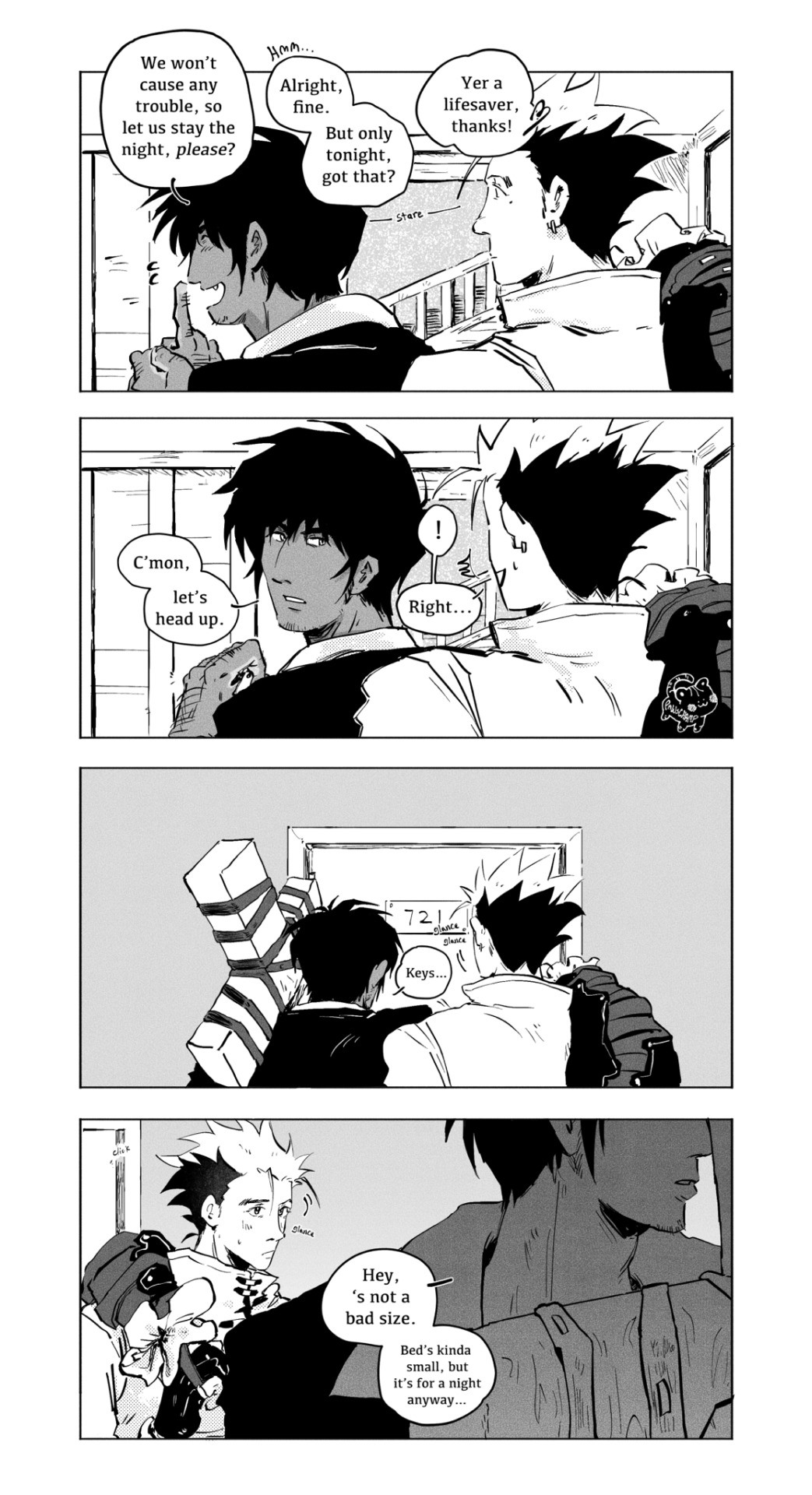
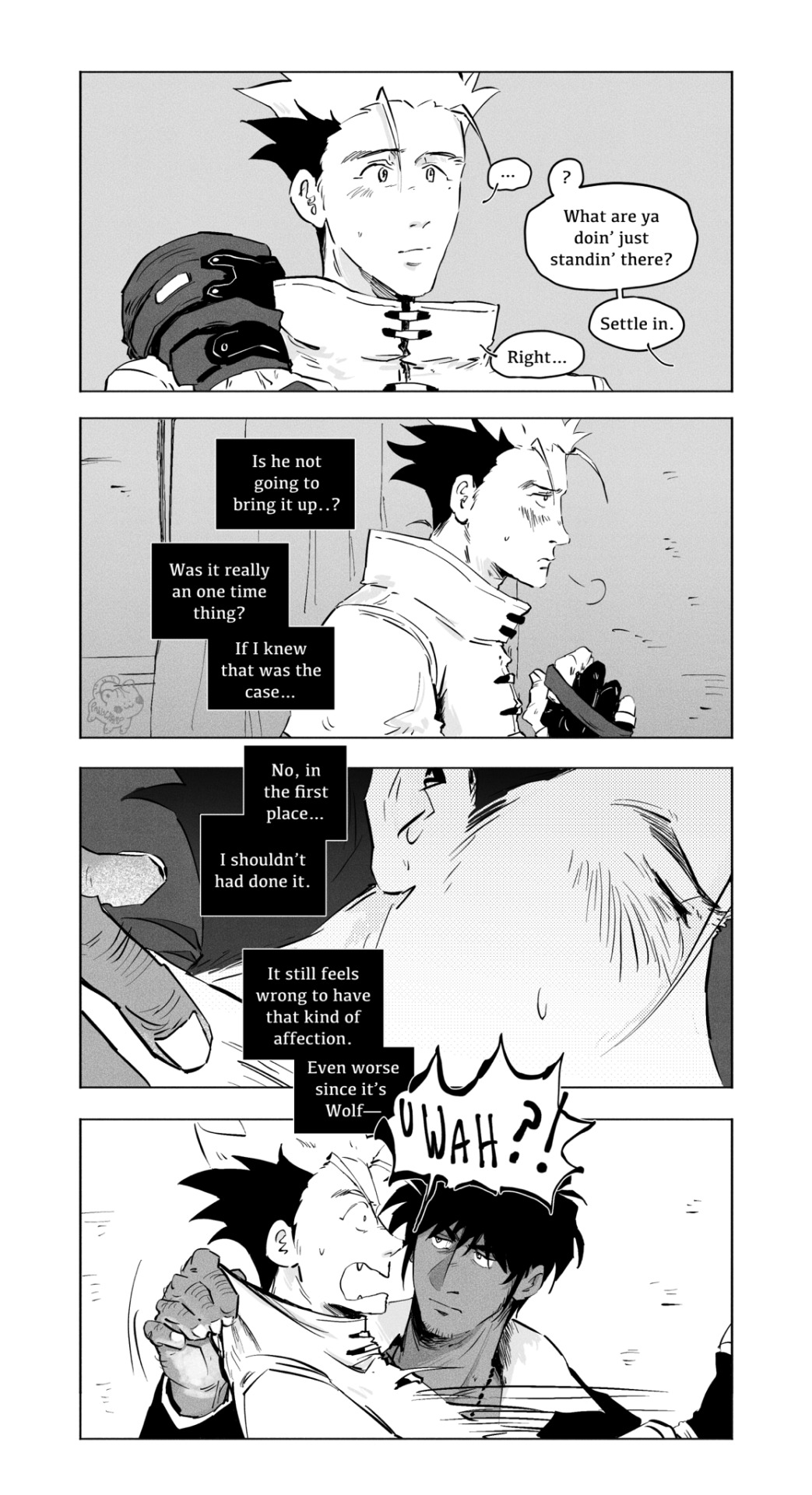
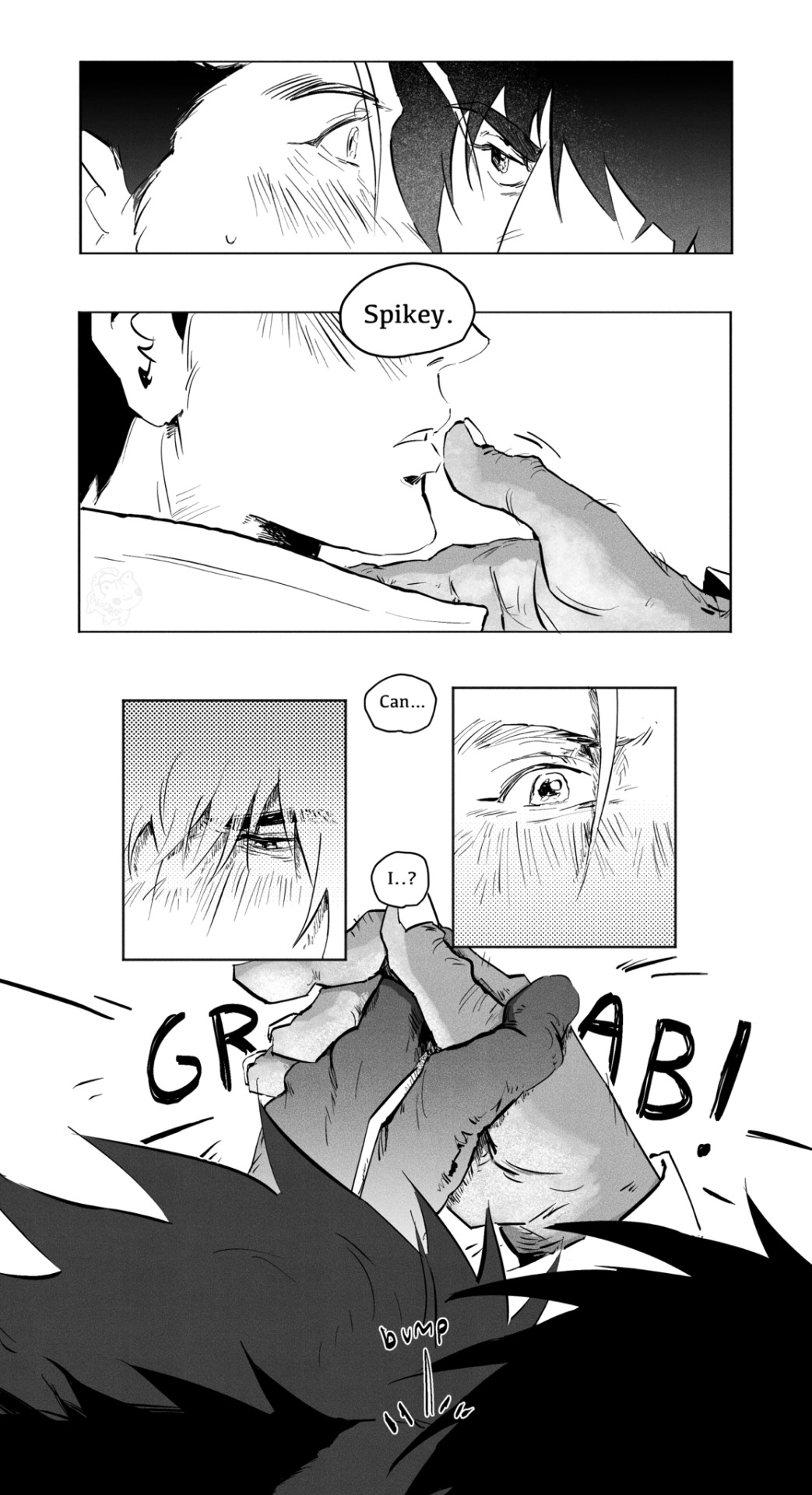
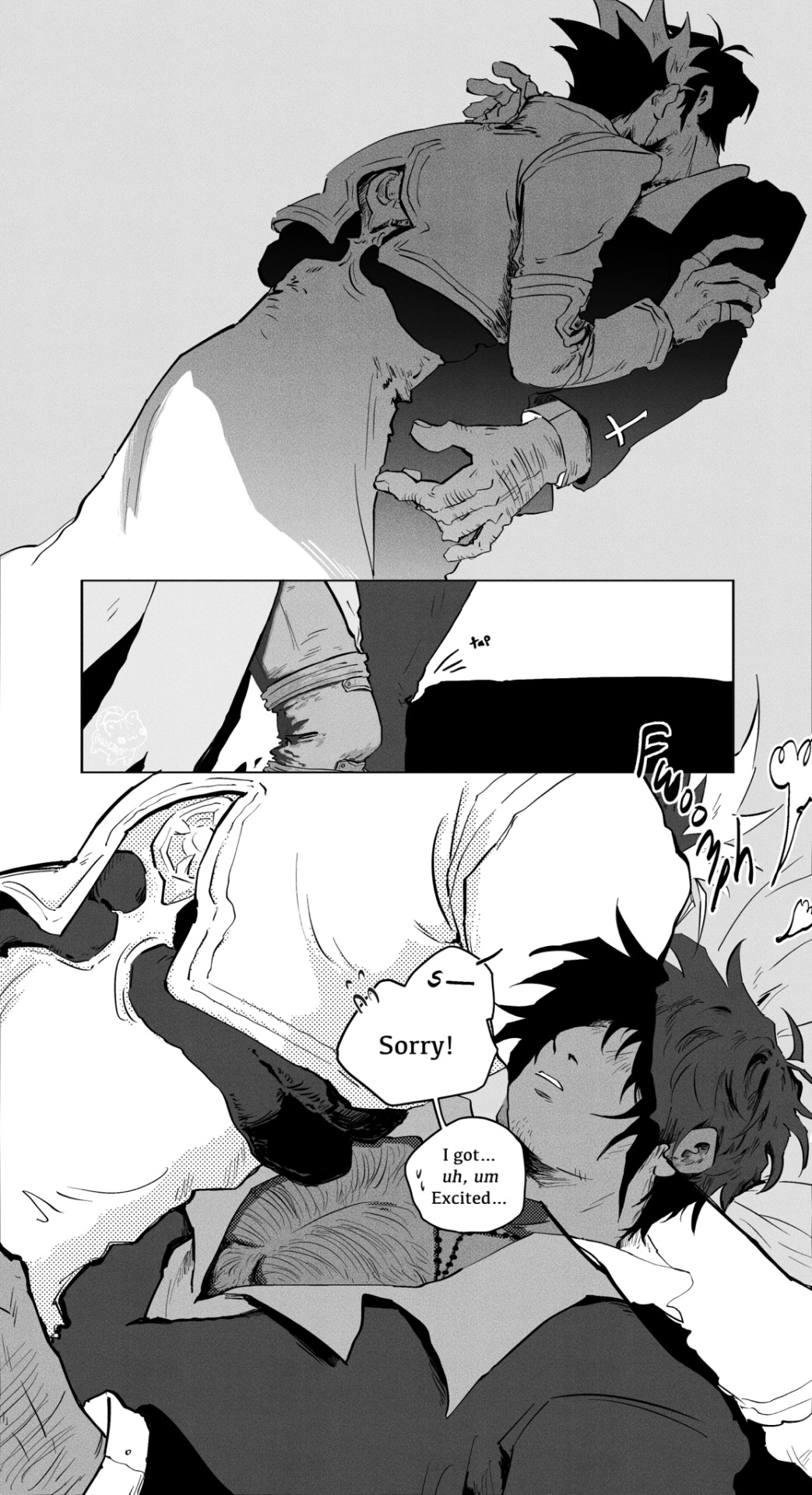

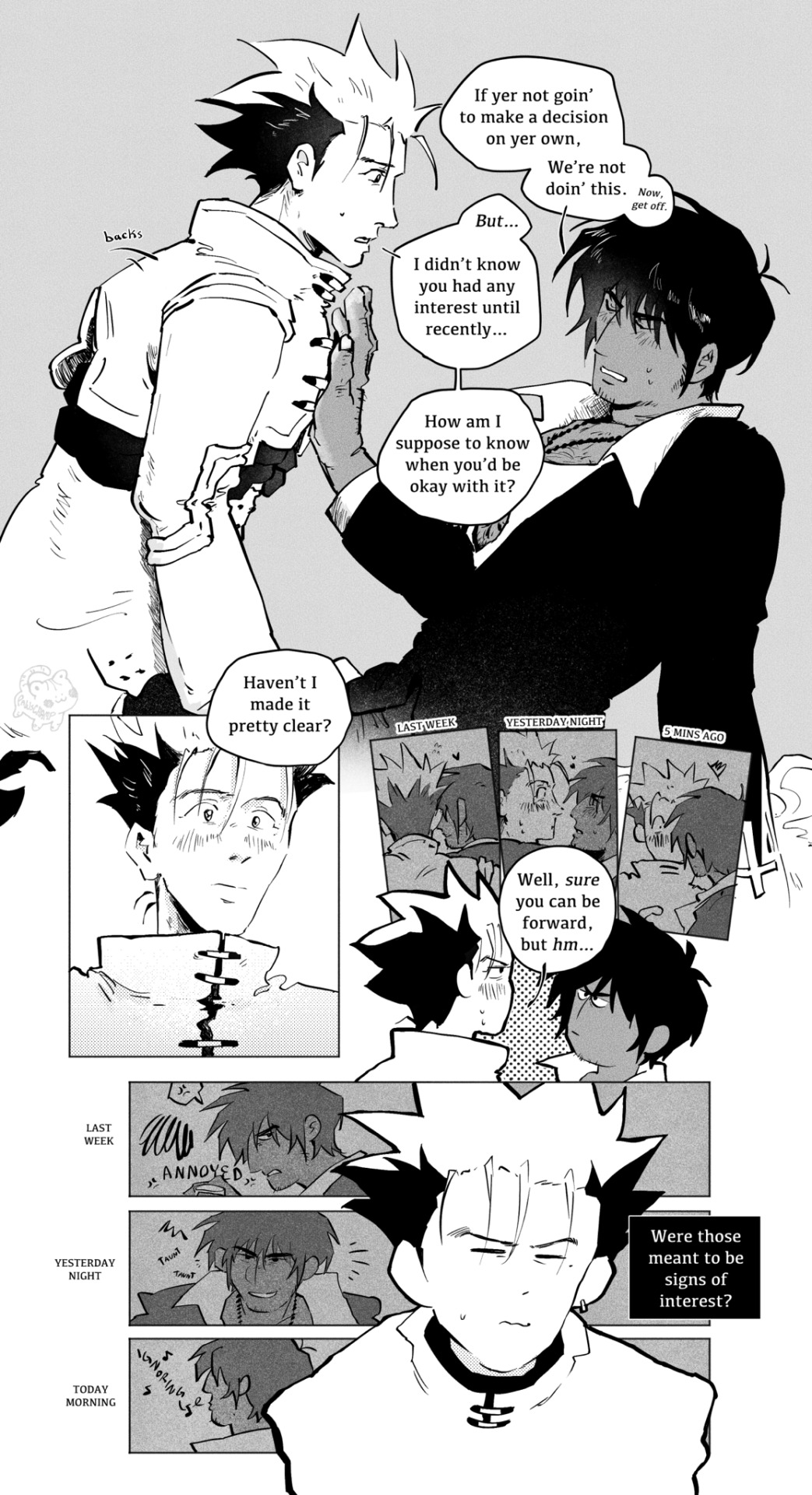
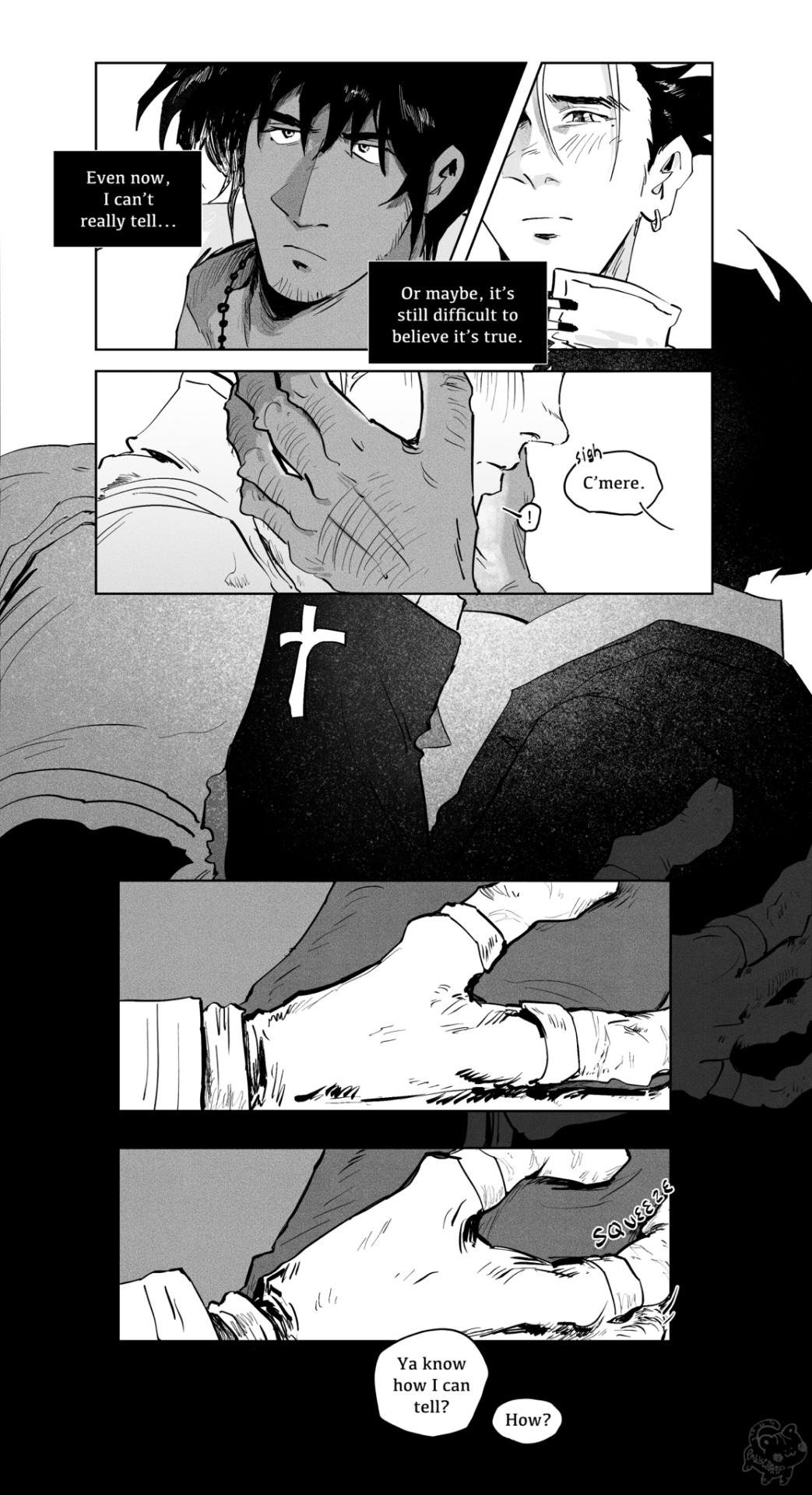
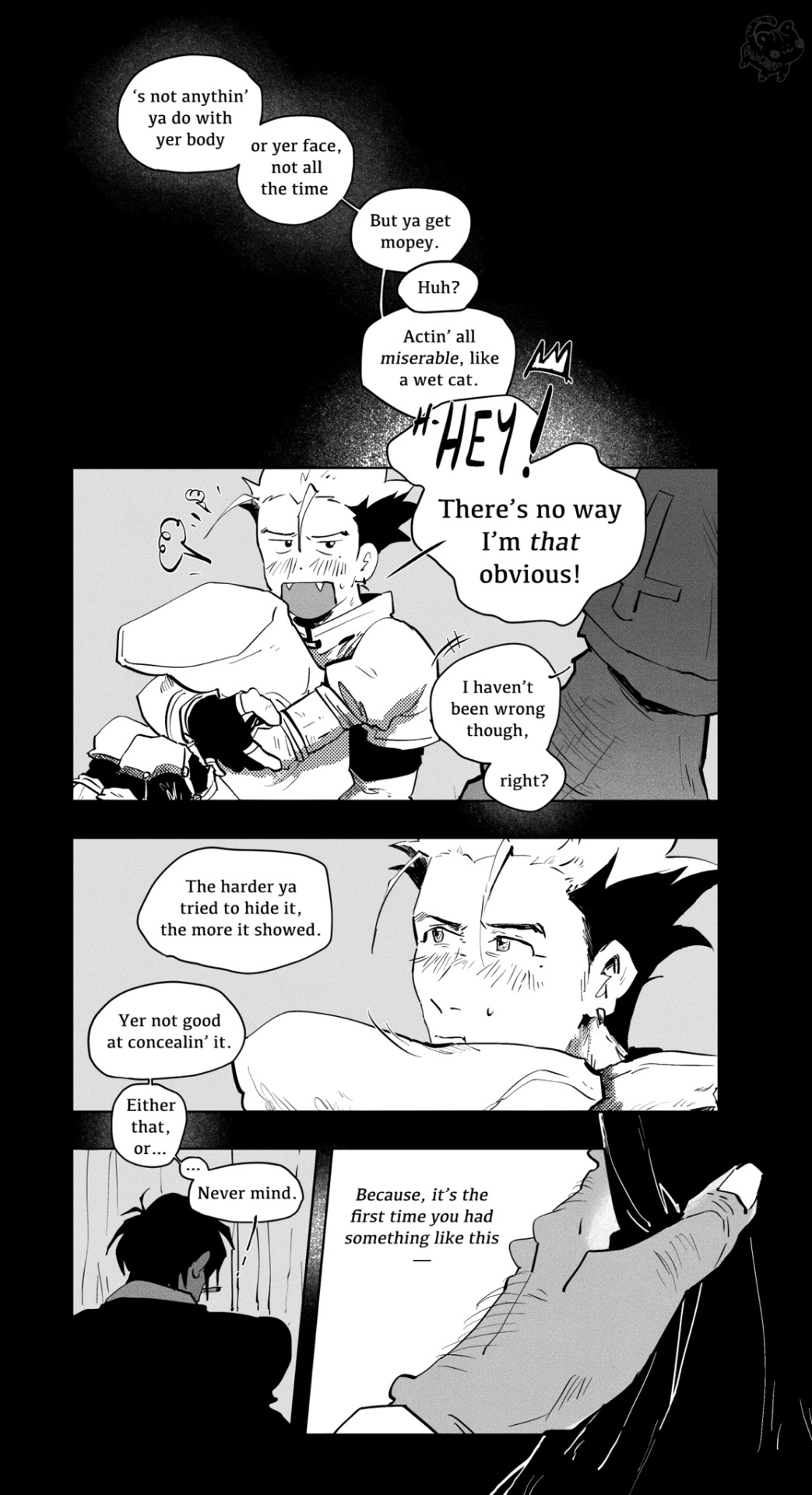

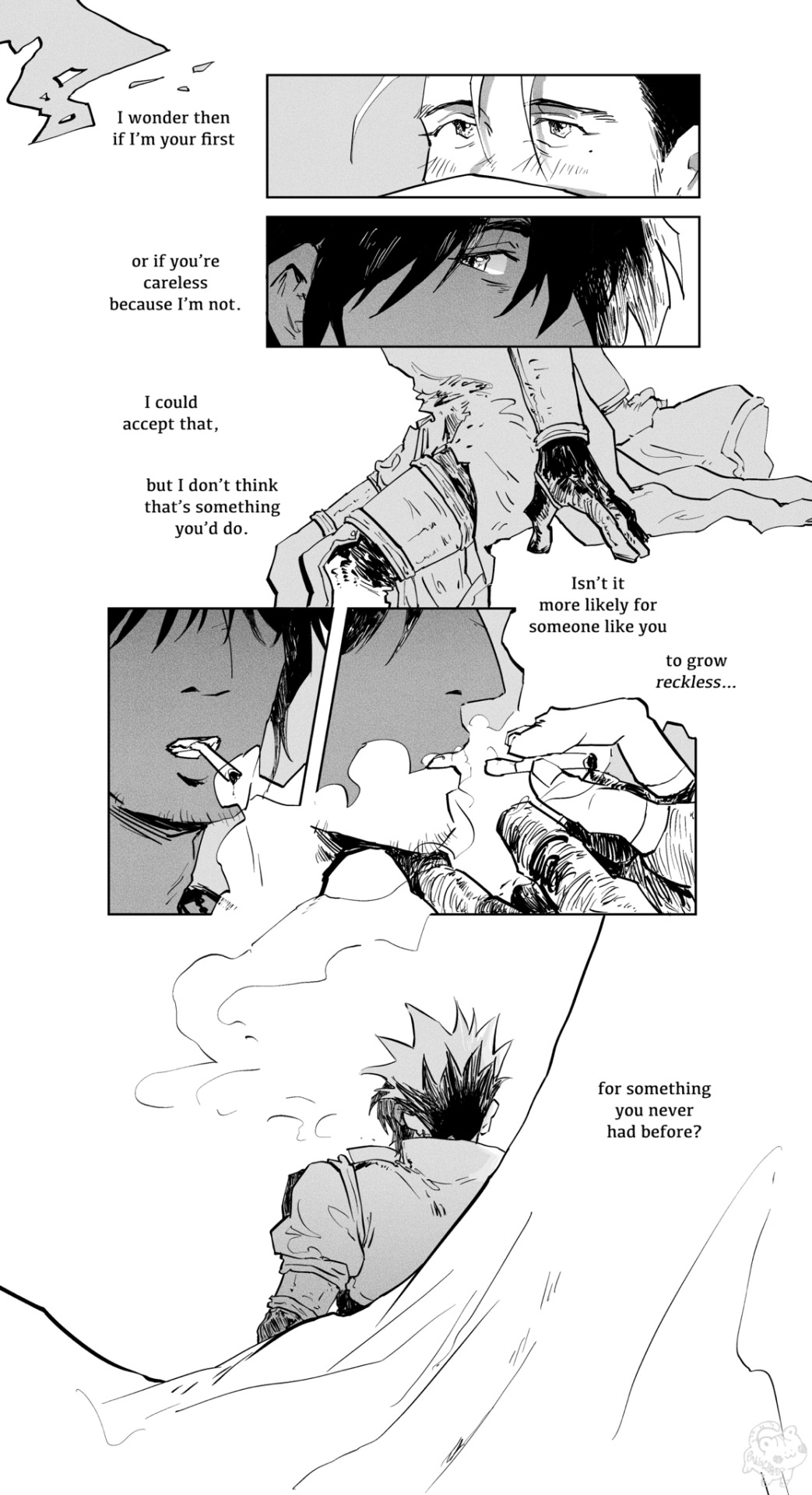
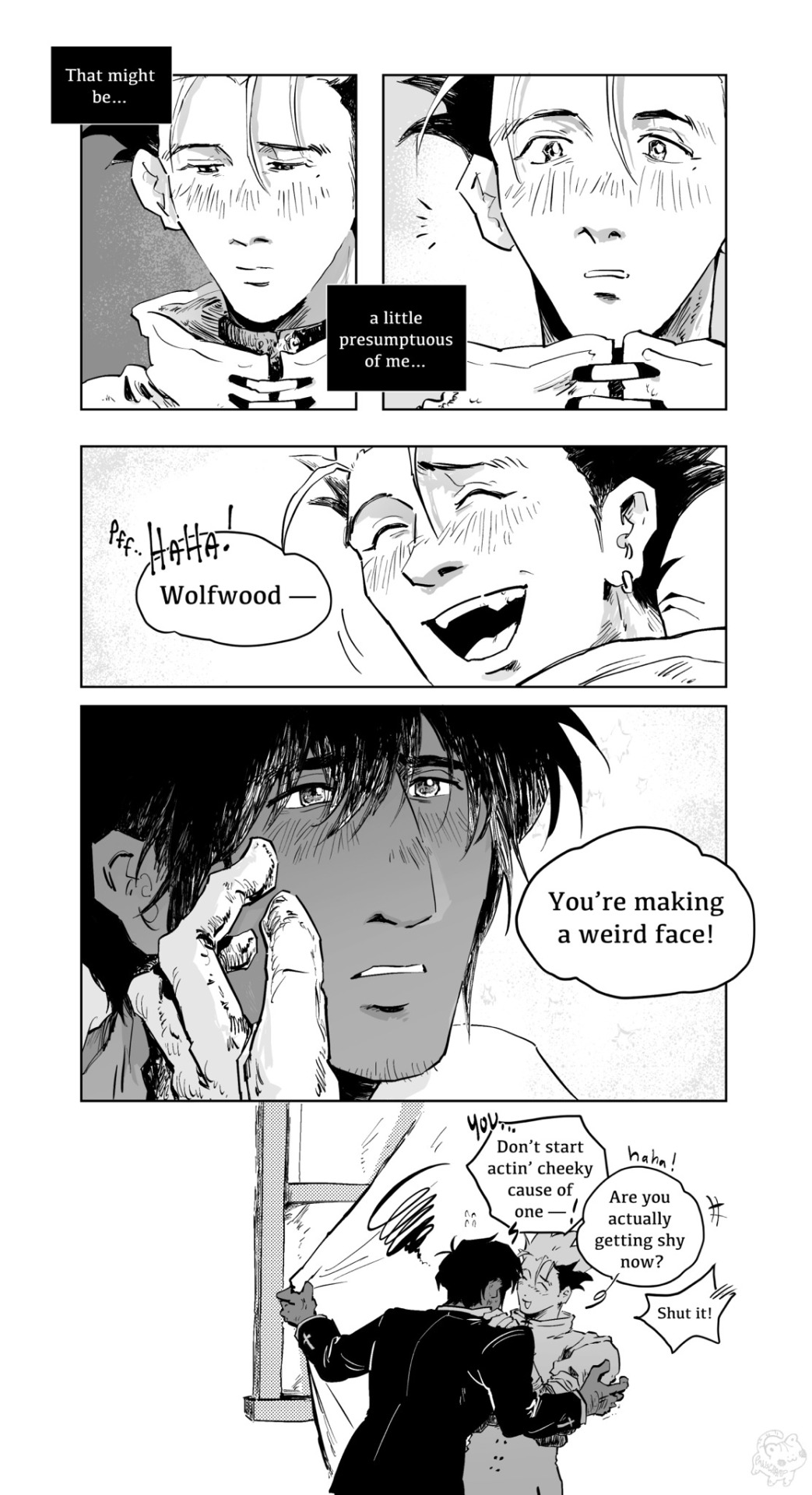

kisses of affirmation (ID in alt)
#vashwood#vash the stampede#nicholas d wolfwood#trigun#trigun maximum#ruporas art#oughrhhhh finally posting this here..... Very Romancey very Cutesy Very what do you call it... Indulging#for the longest time i debated on whether to post this comic at all on my socials - for some reason this was almost the limit to how far i#could push a romantic alternative that cusps ooc-ness for vw but then i ultimately decided its Fine. i couldv made it much more unbearable.#someone on twit qrt this with “vash is such a loser” which means i havent lost my way completely yet so its ok#(sidenote) script is a bit old !! bc this was meant to be a part two to an old comic..! the first kiss comic from feb#it branched off quite a bit that listing this as an actual part two would be kind of awkward now - but that was the initial intention#anyway. please enjoy!#long post
2K notes
·
View notes
Text

RED ALERT RED ALERT
2K notes
·
View notes
Text

Small tasks
#illustration#artists on tumblr#cute#artoftheday#digital illustration#wholesome#small tasks#to do list#procreate art#i love completing small tasks just so i can feel that i matter#i matter#procreate#procreate illustration#cute comics#mental health awareness#place to belong#it's okay if all you did is exist today#it's okay to not feel okay#relatable#relatable illustration#some days#days like this#you will be okay#art#artist on tumblr#artist#mental health#i am doing great#relatable comics
2K notes
·
View notes
Text
Why Do People Like Yanderes?
Hi everyone, my name is Diya, and this was going to be a YT video-essay-type-thing but I'm too poor to afford a mic and too busy with college to learn how to edit videos, so here's my vague exploration of the psychology behind why people like yanderes so much through the lens of my favourite Visual Novels.
TW for uh. yandere content. Mentions of sex, gore, and non-con, particularly in the last topic. This is more like the first draft of an academic paper so while it's not explicit, I do go into some detail.
Introduction
If you’re a fan of anime or visual novels, then you’re probably already aware of what a yandere is, or at the very least you’ve seen that one picture of Yuno Gasai. Still, for the sake of thoroughness, let’s take it from the tippy top. The term ‘yandere’ is a Japanese portmanteau of ‘yanderu’ – the progressive form of ‘yami’ – meaning ‘sick’, and ‘deredere’ which roughly translates to ‘loving’. Together, the word refers to someone who is – in short – extremely lovesick. Obsessive to the extreme, and with little morality to spare, the standard yandere is characterized by a dangerous fixation on a chosen target, often appearing shy and caring at first only to flip the script and become violently aggressive towards perceived threats (Kroon, 2010).
It should be noted that yanderes are not a strictly romantic or sexual trope. The Ancient Greeks classified at least six forms of love, from familial (storge) to guests (xenia). Modern psychologists may distinguish love as either Companionate or Passionate (Kim & Hatfield, 2004) or consisting of three dimensions of Intimacy, Passion, and Commitment (Sternberg & Sternberg, 2018). Realistically, possessiveness shows up in a variety of relationships. However, people are generally primed to view certain dynamics as inherently amorous. Societal norms tend to encourage the idea that romantic bonds ought to rank above all others, and therefore if Person A is bizarrely fixated on Person B, then clearly there must be an element of sexual interest involved regardless of the actual relationship between the individuals in question.
Regardless, yanderes remain quite popular in fiction. Many dismiss it as a fetish, which it can be, but that isn’t the case for everyone. While there is nothing wrong with indulging in kinky fiction, not all of us get horny at the thought of being chained up in someone’s basement, no matter how hot our captor may be. So why is it so pervasive? Why is this trope so appealing that most writers cannot help but include at least a single line of dialogue implying that – if circumstances had been ever so slightly different – my wholesome shoujo romcom might have turned into a psychological horror?
Hybristophilia
‘Hybristophilia’, also known as Bonnie and Clyde Syndrome after the titular criminal couple, is a word is derived from the Greek word ‘hybridzein’ meaning ‘to commit an outrage against someone’ and ‘philo’ which means ‘a strong preference for’. Sexologist John Money reportedly defined it as a paraphilia in which an individual is sexually aroused by a partner who has a predatory history of hurting other people (Money, 1986, as cited in Matuszak, 2017). In his book, Serial Killer Groupies, true crime and crime fiction author RJ Parker distinguished two forms of hybristophilia: passive and aggressive. The former is when an individual contacts a criminal with the intention of striking up a relationship with them, allowing themselves to be seduced and manipulated but having no interest in committing a crime themselves. The latter are far more dangerous, as the individual not only derives sexual pleasure from their partner’s atrocities but are active participants in carrying out or covering up the crime. To quote Griffiths (2013, as cited in Pettigrew, 2019):
“[They] help out their lovers with their criminal agenda by luring victims, hiding bodies, covering crimes, or even committing crimes. They are attracted to their lovers because of their violent actions and want to receive love yet are unable to understand that their lovers are psychopaths who are manipulating them.”
In some ways, hybristophilia is the nearest thing we have to a realistic understanding of why people love yanderes. I mean, much of the fantasy surrounding such characters and their media tend to be filled with posts begging to be spat on or calling the rightfully terrified main character ungrateful for being a teeny bit upset about finding surveillance cameras in their ceiling. However, enjoying fictitious immoral activity does not predict real perpetration, so what does? There exists little consensus amongst psychologists as to what sparks this particular predilection, and that was strange to me. You would think there would be more studies into this topic, in spite of or perhaps because of its controversial nature. Heck, that one dude wouldn’t shut up about white women’s obsession with Bundy and Dahmer, and I assumed he had gotten that information from somewhere, but it turns out that was just him using modifiers to justify sexism.
However, I believe that we can hedge a few guesses, and over the course of my research, I’ve organized the main rationalizations under four umbrellas which I will explore through the lens of my favourite yandere-themed Visual Novels. Please keep in mind that most of these games are rated as mature due to sexual scenes and/or gore. Additionally, in the spirit of transparency, this ramble will be focused exclusively on male or masculine yanderes. So, without further ado:
Call Me Bob the Builder Because I Can Fix Them
If you’re familiar with DC Comic’s Batman, or just happen to have attended any costume event held over the span of the last 20+ years, you may be familiar with the character of Dr. Harleen Quinzel, better known as Harley Quinn. Initially created as the Joker’s one-off sidekick in Batman The Animated Series, she was so well-received by audiences that she became a recurring character in the cartoon and was eventually given a proper origin story in the form of a one-shot titled Mad Love.
Harley’s origin story has seen some alterations over the past decades, but the core aspects remain largely untouched. In the beginning, Harleen Quinzel was a promising young woman who wanted was a degree from the university’s prestigious psychology department, which she gained through…less than scrupulous means.
(Listen, I’m not sure if the authors were leaning on the Dumb Blonde stereotype, or if they simply thought that casting her as a genuinely bad student would make her later actions more believable. Either way, the idea of Harley as someone with a legitimate PhD came later)
After landing an internship at Arkham Asylum – a half-hospital and half-prison straight out of the 1870s that might as well be built out of one-ply tissue-paper soaked with gasoline and left next to a crate of fireworks – Harleen set her sights on the then incarcerated Joker. At the start, her fixation on the criminal wasn’t remotely sympathetic. She didn’t want to help him, she wanted to use him. Harleen Quinzel wanted piggyback off his infamy and write a tell-all tale detailing what sort of messed up childhood resulted in Gotham’s Clown Prince of Crime. Yet the more she interacted with him, the more the Joker took advantage of her empathy. By the end of their sessions, Harley no longer saw him as a violent serial killer with a clown schtick, but as a “lost, injured child looking to make the world laugh at his antics.”
But Diya, you may be asking, what does this have to do with the video? The Joker never loved Harley, and it could even be argued – as Shehadeh did in a 2017 essay – that her obsession with the pasty-faced clown is more akin to Histrionic Personality Disorder. While that may be the case, I believe that Harley’s story provides one of the reasons yanderes are so popular: their backstory.
Whether they were abandoned by their family, bullied by their peers, experimented on by evil scientists, starved on the streets, died under mysterious circumstances and then trapped in a haunted VCR tape for decades, or are simply so impossibly inhuman that they frankly do not understand why it isn’t socially acceptable to imprison their crush in a pocket dimension made of meat and non-Euclidean geometry, yanderes often have fairly sympathetic or at least understandable explanations for why they are Like That. Your mileage may vary significantly depending on how much you sympathize with these motives, but the point is that yanderes always make sense to some degree. Their morality and priorities may be twisted or even completely incomprehensible, but the audience almost always knows the reason, and that can be comforting. In the real world, other people aren’t always straightforward, and we never really know what they’re thinking, but narrative coherence demands a semblance of internal consistency lest the audience end up frustrated and confused. So yanderes are not only easy to sympathize with, but also fairly predictable. In-universe they may be unhinged freaks with a blood fetish, but to you watching from behind the safety of the screen they’re just acting out the script written for them based on a prototype. And if you understand the why behind their loose gears, then you might just be able to put them back together again.
The concept of rescue romances or “I Can Fix Them” has been around in our stories for thousands of years. The Epic of Gilgamesh detailed how Shamhat essentially ‘civilized’ wild man Enkidu through ritual lovemaking, and a concerning number of religions push the idea that women are dutybound to save men from the follies of sin. Yet men are not exempt either, with one notable example being the German fairytale, King Thrushbeard. Call it what you will regardless: Knights in Shining Armour, the Florence Nightingale Effect, or a plain old case of Because You Were Nice to Me, studies have shown that human beings generally like helping [DA2] others, even when the reason doesn’t necessarily stem from pure altruism. I will delve deeper into this later, but care and compassion are deeply ingrained in human nature, and arising from those roots is the appeal of this mentality: You can save them. You can change them. You can make them better. You are special, and the way you treat this person carries a weight that has not and will never be matched by anyone else for the rest of their mortal or immortal existence.
The illusion is a delicious one, especially if the person you’ve helped turns out to be a billionaire CEO with cash to burn, a super powerful ghost king willing to raze continents to dust for you, a demon having fun on a Friday night, or just your average hot creep with a knife. Moreover, different people have different ideas of what ‘fixing’ even means. Maybe you want to single-handedly rehabilitate your yandere into a functional member of society. Maybe you’re cool with the incessant stalking but would like them to stop slaughtering your friends, family, and local service workers. Maybe you want to make them much, much worse.
Not only do yanderes provide immediate proof that your actions have a tangible impact on the lives of others, but the fantasy also includes the desire of being seen as special. Of being admired and adored by someone whose life you inexplicably made better by virtue of simply being yourself, or an idealized version of yourself. In this fictional world, in this imaginary setting, the person you are is so uniquely, impossibly irreplaceable to someone. And if that’s the case then they can’t risk losing you, can they?
The Allure of Obsession, or ‘Til Death Do Us Part (Literally)
It shouldn’t be necessary, but here is my obligatory disclaimer anyway. Ahem: obsession is not a good thing in real life. Fixating on another human to the detriment of your own wellbeing and that of those around you is dangerous, as is encouraging someone else to obsess over you. You might think you are being worshiped, but real life is not a visual novel. The outside world doesn’t come with an age rating, the author’s guiding pen, and a convenient fade to credits sequence once you’ve reached an ending. The consequences will still be there in the morning, so don’t do it. Just don’t.
PSA out of the way, it’s natural to want to be wanted. Maslow’s Hierarchy places it just above physical safety, but I’d argue that it could easily be compared to baser drives. According to many psychological and anthropological studies, much of humanity’s continued survival and environmental dominance is largely attributed to our ability to form groups, cooperate with one another, and maintain complex interpersonal networks. Social support, intimacy, and a sense of belonging are linked to emotional and physical benefits, such as more optimistic health perceptions, higher subjective well-being, increased creativity and innovation, and greater self-efficacy (DeWall & Bushman, 2011; Harandi et al., 2017; Wang & Sha, 2018). Therefore, it’s perfectly understandable that rejection of any sort would be construed as a threat.
But if someone is obsessed with you, then you have no reason to worry about that, right? No more nights spent agonizing over how they feel about you, asking yourself whether your last text made you sound too desperate, or if you’re boring them because you spent the past hour info-dumping about Stardew Valley farm layouts. With a yandere, there will never be any doubt that they care about you. Sure, they might go about it in weird, manipulative, and insidious ways that violate your physical and mental autonomy, but you can’t deny their loyalty. They do love you in their own bizarre way. You are the sun around which they orbit. When you’re in the room, no one else exists. Every single messy flaw is just another bullet point on the mile-long list of why they adore you.
In essence, yanderes are not only attentive, but their love can be virtually unconditional. A yandere might know everything about you, and still revere you. It’s unhealthy as hell and you might genuinely question their taste, but it can be tempting to pretend that all of you, right down to the ugliest parts of yourself – the traits and choices that you would never share with another living soul even at gunpoint – are worthy of understanding, if not open praise and affection.
Attractiveness, or Okay but Have You Considered That They’re Hot Though?
.
.
.
I mean what am I supposed to say here? They’re hot, what do you want from me?
No, but in all seriousness, fictional media paints an idealized version of the world, and most yanderes are hot because they have the freedom of existing purely behind that screen; artfully arranged and edited to forever appear compelling to anyone who happens to enjoy their particular style. And there are a lot of styles to choose from. Whether you want them pretty faced and disarmingly cute, or scarred up and big enough to pin you like a butterfly, yanderes come in a wide variety of shapes and sizes that are meant to pique your interest and draw you in like a naïve little fish being lured towards the mouth of an angler fish, unwilling to believe that anything bad might happen to us when the bait is this pretty.
This is often referred to as the Halo Effect, a form of cognitive bias referring to the tendency for people to assume that a single obvious positive trait must be associated with other positive traits. The go-to characteristic is typically physical attractiveness, but a nice voice, good humour, and cooking skills are also factors which serve to influence our perceptions.
So, conventional physical attractiveness is one thing, but that’s only skin deep. What about beyond that? After all, the yandere still has to talk to you before they enact their master plan of tying you up in their basement until Stockholm Syndrome kicks in.
When I showed my friend a picture of John Doe from the game John Doe, she told me that he looked like a creepy slob, and she’s far from the only person who’s ever thought so. Look at them. I feel like if I tried to comb that hair it would simply eat me, and some of the CGs really put the scopophobia in Scopophobia Studios. I love Doe, but he is not hot, and he doesn’t behave in a normally appealing way either. If the player chooses not to take a bath, Doe will immediately comment that you “smell good” before following you home, breaking into your house, and leaving a bloody organ on the floor for the player to trip over. Many yanderes can at least fake a veneer of normalcy, but from the get-go Doe doesn’t even bother to pretend he’s anything less than an otherworldly creature stuffed into a vaguely person-shaped meatsuit. In an effort to find out why so many people had latched on to Doe – including me – I shopped around social media and YouTube for answers, and what I found was a widely unanimous sentiment.
While some were drawn to his fun design and goofy personality, most simply thought that he wasn’t inherently malevolent, just very confused. In addition to being a supernatural being with a completely alien axis of morality, Doe’s meta-awareness and unbridled attempts at winning the player’s affection lends him quite a bit of support from the audience, especially if you yourself also happen to struggle with social cues and relate to his pure earnestness. In Ending 7 of the extended version, the player character has the option to tell Doe – who has altered himself to pass as more ‘normal’ – that they prefer who he truly is, at which point he grows visibly flustered and sports an adorable pair of literal heart-shaped pupils.
Whether they’re charismatic, seductive, cute, sweet, funny, nurturing, or generous, the best yanderes have engaging personalities. Even while they’re committing truly heinous crimes against God, man, and your guts, you still kinda want to hang out with them, and you want them to acknowledge you as being just as interesting. And this is all fine in fiction because you’re the one in charge, and if you ever get bored or uncomfortable or busy with something else, then you can simply close the tab or window with zero consequences, which brings us to the final and most important reason.
Power Dynamics and Consent in Fantasy (I Couldn’t Think of a Joke Here Guys, This Is Kinda Serious)
Once again, I feel that I must preface this section just for the sake of my own peace of mind: sexual coercion and assault are vile and disgusting crimes that should never be emulated or tolerated in the real world. We are speaking purely of fictional media, specifically adult-oriented media in this case, so please be mindful.
In 2009, Bivoni and Critelli conducted a study on 355 undergraduate women with the goal of assessing the reasons behind fantasies of non-consent. At the time, there were two leading explanations of this phenomenon. One stated that women with high libidos but repressed views of sex used these imaginary scenarios to alleviate the guilt they had grown to associate with sex. Because the simulation was a purely mental exercise and they themselves were cast as helpless victims in the scenario, they were able to remain blameless while still finding sexual gratification. The second stated that these fantasies were an expression of liberation by women who were adventurous and comfortable enough with their own sexuality to engage with taboo ideas that they weren’t at all interested in performing in real life. Which do you think was more common?
.
.
.
If you guessed the second option, you’d be right. The study found that of the 220 women who had experienced such fantasies, 45% found theirs erotic, 46% were mixed, and only 9% reported pure aversion. One justification for this outcome relies on psycho-biological theories, for example masochistic preferences or the unintended activation of the sympathetic nervous system and subsequent mis-attribution of arousal. Other reasons have to do with higher order thinking and are tied to the power dynamics within such fantasies. On the surface is the appeal of being so desirable to someone that they simply cannot control themselves, but then there is a deeper impulse, which the researchers referred to as Adversary Transformation. To quote the article: “[fantasies] involve a struggle between an assailant and a potential victim in which it is relevant to consider who is the winner and who is the loser. At one level, it is a struggle over sex, but the woman's non-consent may be feigned or token. At another level, the woman may be seeking a victory that is not about whether sex occurs, but about what happens emotionally between the protagonists.”
Basically, the imaginary perpetrator may have ‘won’, but the self-character need not have ‘lost’.
Media provides an extra layer to the illusion, one that you as the viewer have absolute control over. If you are choosing to engage with a piece of media that explicitly labels itself as including R18+ yandere content, then you clearly have some expectations, and that background awareness goes a long way in reducing long-term discomfort and allowing audiences to make informed decisions. If you don’t like the plot, you can simply turn it off it with the click of a button, and when the screen goes dark it’s not like the yandere is going to punish you for saying no. Strade isn’t going to break into your house with a drill, there are no homicidal clown ghosts hiding in your TV, and no suspicious pink-haired hackers watching your webcam. They aren’t real, and the consequences aren’t real either. You have all the power here.
Conclusion
In summary, Yanderes are appealing for a variety of reasons. Whether you want to save them, think they’re attractive, wish to indulge in a dream of being utterly coveted, or simply enjoy a bit of spice in your me-time, it’s obvious why the trope has persisted for so long and will likely continue to do so. If you enjoy yanderes but are worried that having a taste for the less wholesome side of things might imply something about who you are as a person, don’t be. The notion that fantasies and media preferences directly reflect subconscious desires is not only painfully out of date debunked nonsense but also indicative of restrictive ideologies wherein bad thoughts = sin. This isn’t 1984. You haven’t committed a thought-crime by having a weird kink. You aren't going to superhell for fantasizing. The human mind is hardly ever so mathematically rational, and the point of fiction is to allow us to safely engage with and explore various ideas, provided the everyone involved is mentally, chronologically, and emotionally mature enough to do so.
Thank you all for listening to me. If you learned something or were just a little bit entertained. If you're curious about knowing more, I've listed my sources below
REFERENCES
Bivona, J. M., & Critelli, J. W. (2009). The Nature of Women’s Rape Fantasies: An analysis of prevalence, frequency, and contents. Journal of Sex Research, 46(1), 33–45. https://doi.org/10.1080/00224490802624406
Critelli, J. W., & Bivona, J. M. (2008). Women’s Erotic Rape Fantasies: An Evaluation of Theory and research. Journal of Sex Research, 45(1), 57–70. https://doi.org/10.1080/00224490701808191
DeWall, C. N., & Bushman, B. J. (2011). Social acceptance and rejection. Current Directions in Psychological Science, 20(4), 256–260. https://doi.org/10.1177/0963721411417545
Flynn, F. J., Reagans, R., Amanatullah, E. T., & Ames, D. R. (2006). Helping one’s way to the top: Self-monitors achieve status by helping others and knowing who helps whom. Journal of Personality and Social Psychology, 91(6), 1123–1137. https://doi.org/10.1037/0022-3514.91.6.1123
Harandi, T. F., Taghinasab, M. M., & Nayeri, T. D. (2017). The correlation of social support with mental health: A meta-analysis. Electronic Physician, 9(9), 5212–5222. https://doi.org/10.19082/5212
Hazen, H. (1983). Endless rapture: rape, romance, and the female imagination. https://openlibrary.org/books/OL3161300M/Endless_rapture
Kroon, R. W. (2010). A/V A to z: An Encyclopedic Dictionary of Media, Entertainment and Other Audiovisual Terms. McFarland.
Matuszak, M. (2017). Hybristophilia White Paper. https://static1.squarespace.com/static/55dfd21ee4b0718764fb34cc/t/5cb7cabee5e5f00ab13be58b/1555548863275/Hybristophilia+White+Paper.pdf
Oarga, C., Stavrova, O., & Fetchenhauer, D. (2015). When and why is helping others good for well-being? The role of belief in reciprocity and conformity to society’s expectations. European Journal of Social Psychology, 45(2), 242–254. https://doi.org/10.1002/ejsp.2092
Parker, R. (2014). Serial killer groupies. RJ PARKER PUBLISHING, INC.
Wang, T., & Sha, H. (2018). The influence of social rejection on cognitive control. Psychology, 09(7), 1707–1719. https://doi.org/10.4236/psych.2018.97101
#reference list is completed!#yandere#sunny day jack#my dear hatchet man#mdhm#stnaf#ddlc#john doe#boyfriend to death#tpof#degrees of lewdity#your boyfriend#14dwy#br<3ken colors#camp willowpeak#br0ken colors#obey me#favour vn#binary star hero
1K notes
·
View notes
Text
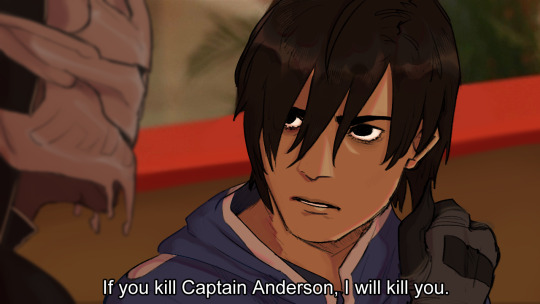
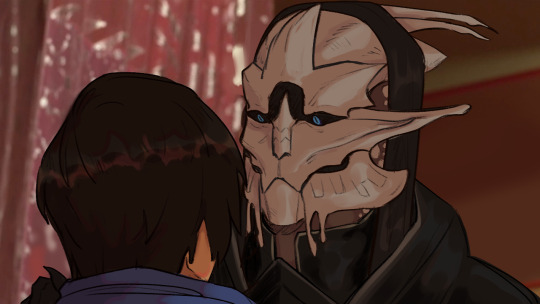
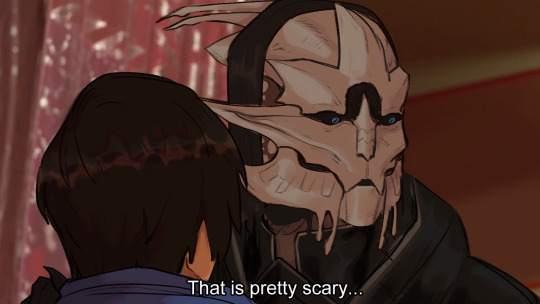
my own no-reapers au where it's just anderson has adopted dan when she's still a shithead teenager off the streets instead of agreeing to send her to the alliance. and saren is there to be a sunday cartoon villain. and hijinks ensue. (drawn over the yakuza movie)
#i am Burning#mass effect#dan shepard#saren arterius#commander shepard#is 16 years old and has an impressive crime list already and saren is a little intimidated at#anderson's scary charge#shes completely serious about this threat and can and will carry through with it#my art
584 notes
·
View notes
Photo

Christopher Skaife: The Ravenmaster
To catch and capture a[n escaped] raven in full view of the public is a tricky business and to be avoided if at all possible, since it requires not only a cool head and steady nerves but quite a bit of luck. My first piece of advice to anyone finding themselves in such a predicament would be to stay cool and to pretend you have total control of the situation, which you most certainly do not. Like it or not, you're about to become a star on YouTube.
(picture: ravens Munin and Jubilee II, taken during my 2017 trip to the Tower of London)
Tradition holds that there must be no fewer than six ravens kept at the Tower of London, or else the British throne will fall. Of course, for all of their intelligence and capability, it wouldn't be reasonable to expect a population of ravens to survive in the Tower all on their own. Enter the man with one of the most unique jobs in the entire world: yeoman warder Christopher Skaife— the ravenmaster.
As the person most responsible for the most famous collection of corvids in the entire world, Skaife is in the singular position to share the stories of these remarkable animals. His respect and love for both ravens as a species and also these specific birds as highly intelligent individuals drips from every page. As the yeoman warders live within the Tower, Skaife is also able to give us a look into the inner workings of one of the most recognizable (yet still secretive) tourist destinations on the planet.
The Ravenmaster is very loosely structured as a day in the life of Christopher Skaife, beginning with the dawn checks on the ravens and ending with shepherding them back into their enclosure. The narrative meanders throughout, however, exploring Skaife's stories about caring for the ravens, their mischiefs, their astonishing primate-level cognition, Skaife's own history, his mistakes, his successes, his dreams, and the curiosities one of the world's most famous castles has accumulated over its long history.
Like a lot of the best nonfiction work, Skaife is the teller of stories you simply cannot find anywhere else. His willingness to approach his vaunted job— quite literally his place in a mythology— with candor is vital to what makes The Ravenmaster succeed. For instance, he quite readily acknowledges the key story of the ravens— that they are an ancient augur of the health of the monarchy— cannot be attested to before the late 19th century.
And, listen: I grew up outside of Philadelphia. I took multiple field trips to the Betsy Ross House. I fully understand how the story around a thing can become more important than whether or not the story is literally true. But I really appreciate how Skaife is willing to approach these stories with objectivity, even if that might undermine his very title.
We are fortunate that, for as much as Skaife is a professional animal caretaker, he is just as much a professional storyteller. The warders are responsible for leading tours of the Tower, something they take quite seriously. If I were to level one criticism, it's that the written structure of the jokes, stories, and even the larger flow of the book feel a little off. Once I realized, however, that this is an adaptation of Skaife's tour story, it made much more sense. If you imagine that you're hearing this story as he leads you through the both literally and metaphorically layered history of the Tower of London, that's the best form of The Ravenmaster. You don't, in fact, actually need to imagine it: there exists an audiobook version, narrated by Skaife himself. I would encourage you to check it out.
I read this book because I love corvids. Every spring and summer, there is a colony of blue jays who take up nesting in my neighborhood, and they've come to know me by sight. It is a wonderful feeling when a corvid likes you— or, at least, has you pegged for a sucker. For that reason, I thought I might close with Skaife's advice for how he came to fall in love with ravens:
If you are in any way interested in birds, and yet like me just a few years ago you don't know where to start, I suggest studying a particular bird: don't try to learn about every species all at once. Pick a bird you love, or which fascinates you in some way. It doesn't matter which one: a goose, a swan, a sparrow, a hawk. Learning about birds, like learning anything else, is all about patience and persistence and just doing the little things right, again and again. Get to know your bird. Attend to their peculiar traits and the shape of them, their flight, their song, the way they walk. Study their talons, their feathers, their tails. Look into their eyes.
If you'll excuse me, I've got some homework to do about blue jays.
#completion list#books#completed#todo#review#christopher skaife#the ravenmaster#nonfiction#birds#ravens#the tower of london#corvids#tower of london#history
16 notes
·
View notes
Text
got a worm nibbling my brain. can someone help me find a piece of obscure media?
webcomic/indie comic from the 2010s. basically a sci-fi short story about a young girl (with red hair?) who was being raised by scientists as part of an experiment. she receives a haircut/has her head shaved, in preparation for her annual brain scan/testing. it is revealed that while her body is human, her "brain" is artificial, made of computer implants throughout her skull and spine. at some point her biological mother (also a scientist on the same campus?) encounters her and is repulsed, viewing her as a machine who has murdered her daughter.
it was very poignant and it bruised my heart and i can NOT find it anywhere
#i thought it was made by the creator of 'O Human Star' for some reason but apparently not?#goddammit goddammit goddammit#'i don't have to write down the title of this piece of media i encountered in my formative years bc i'll always remember it'#*cut to ten years later frantic googling*#fun fact 'a.i.' is now a completely useless search term#google in general is useless#and stuff i read 3+ years ago regularly vanishes from the internet#bookmarks are not enough! if you like indie media--download that shit! buy digital/physical copies while you can#save it to the cloud back it up and organize that shit!!!#keep a list of the stuff you read (organized by date/media type and possibly with keywords if you want it to be useful longterm)#(or a spreadsheet even if you're like me and rabidly consume short stories/comics like a pack of amnesiac piranhas on a feeding frenzy)#(that stuff PILES UP over the years ok. if you wanna make sure you'll be able to find it again a decade later--curation is key)#because art WILL touch your soul and then vanish into the void leaving naught but a 404 Error in its wake#i am an old man shaking my fist at the kids on my lawn but the kids on my lawn are me and my longterm digital planning skills circa 2012
3K notes
·
View notes
Text
The interpretation of Rise Raph as a 'perfect responsible soft boy uwu' is so BORING I'm sorry, Raph is a rowdy adrenaline junkie with anxiety and I won't take this slander any longer
Raph secretly kept an enemy soldier in their actual literal house as a sparring partner. Raph glued his brothers together and dragged them out to fight crime. Raph once asked Leo to punch him in the face to prove he 'takes damage like a boss.' Raph tried to lift a school bus, twice. Raph offered to help his favorite wrestler beat his little brother up. When Leo suggests evacuating Bullhop, Raph says no bc the best defense is a good offense babey. Raph's idea of a 'friendly chat' with April's upstairs neighbor is to put on a black ski mask and go stand menacingly at their door. It takes Raph 10 episodes to conclude that they should MAYBE start training. Raph's plan to get a potentially priceless (and potentially FRAGILE) museum artifact is to punch a car in the middle of a busy street and also cut it in half with his brother still inside.
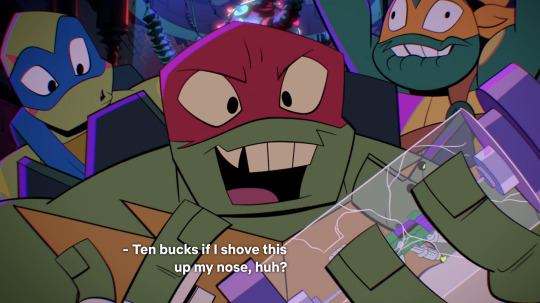
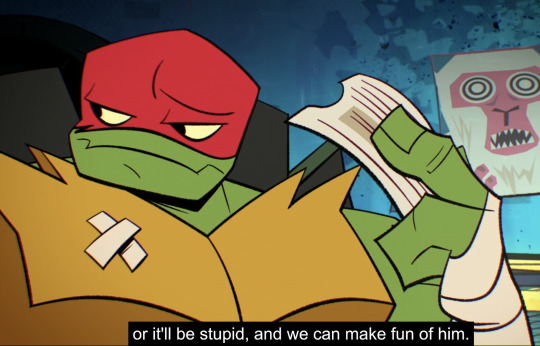
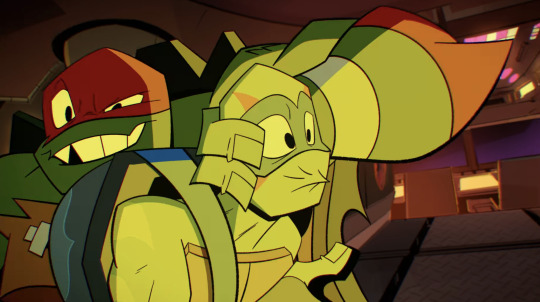
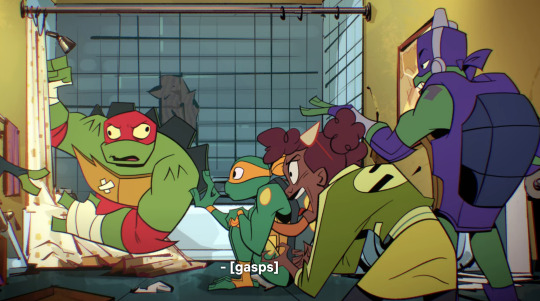
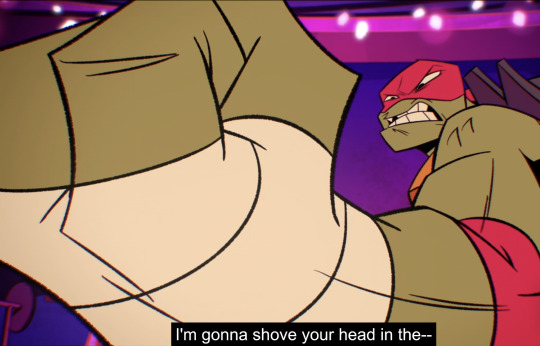
Raph's never met a problem he wouldn't try to punch in the face and does not know the meaning of the words 'excessive force.' He roughhouses with his bros and drags them out to fight villains and thinks any plan that doesn't involve an all-out brawl is boring and lame. He'll do anything to protect his family from harm and be a hero, but also he eats wet salami off the floor and once single-handedly destroyed a library.
I just adore how, at his core, Rise Raph is such a classic Raph—impulsive and stubborn and caring and passionate. He is a very sweet, strong, honorable guy who has a very powerful sense of personal responsibility... and he is also the exact kind of jock who throws you in the pool at a party without checking if you have your phone in your pocket first.
#rottmnt#rottmnt raph#raph#don't worry then he'll freak out and buy you a new one#anyway! raph rules!!!!!#and i think the movie has made some people interpret him as like the 'responsible mom' character which is a bummer#bc that's really not him at all#like this is not even NEARLY a complete list of raph's shenanigans#he's a hooligan a fool a dumbass (affectionate)#he loves big flashy exciting fights and does not spare a single thought to stealth 90% of the time#he gets distracted on missions taking selfies with pizza pigeons and wrestlers#and gets annoyed in eps like Bug Busters when leo suggests being more cautious#he would die for his brothers but also he's definitely the type to like. walk into their rooms and sit on them for fun#he values responsibility so much but also makes the most batshit decisions ever#and has probably caused the state of new york thousands of dollars in damages#and he's NOT the boys' dad jesus christ#he grows slightly more serious over the course of the series (out of stress :(()#but at his core he's just a kid who loves fighting and being a hero#and i love him so much ok!!!!!!
2K notes
·
View notes
Text
Enjoying the [MYTHICAL CREATURE] vs. [UNEXPECTED WILDLIFE] polls? Having fun with the discussions?
Good news: I made a ranking game with 40 different unexpected visitors for you to choose between! Some extant, some mythical, some extinct, some pop culture - this game will put them in pairs and ask you to choose:
It's a Sunday afternoon. You hear an unexpected knock at the door. Which of the two options presented would surprise you the most to find on your doorstep?
Have fun!
#fairy vs walrus#walrus vs fairy#quizzes#i have a free blaze coupon in my email i might just use on this#yeah i think i'm gonna#i want more info#as a side note i'm FASCINATED by the implications of the fact that 13 complete rankings in#the [REDACTED TO AVOID SKEWING RESULTS] is at the BOTTOM of the list
261 notes
·
View notes
Text
Been doing a plot overhaul of Ghosts of Gotham and the time line is getting wild but at least I have the general vibes of each of the four big plot lines figured out:

(shoutout to Brennan Lee Mulligan's portrayl of Tula on Burrow's End for making me realize what Dan's story was gonna be lol)
#dpxdc#ghosts of gotham#ghosts of gotham au#danny fenton#jazz fenton#danielle phantom#dani phantom#dan phantom#I have 53 scenes added to the timeline so far. Not total. Just what I have added to the timeline so far of my List (TM).#This thing is turning into a beast but I can't stop thinking about it#but also can't WRITE it until I figure out at least the bare bones of the plot#yeah 53 planned scenes counts as bare bones for this one lol#i've written over 30k words for this au and only have two actual completed chapters written send help
444 notes
·
View notes
Text
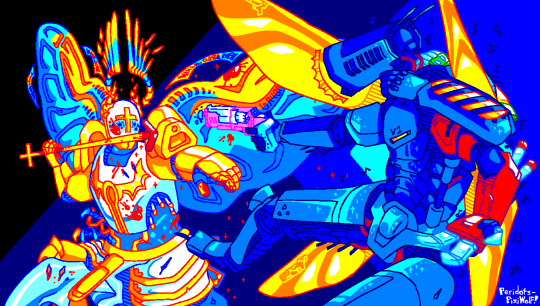
[Start ID. A digital drawing of Gabriel and V1 from Ultrakill in super-saturated, pixellated colors. It seemingly takes place during phase two of his second fight, judging by Gabe's bright yellow-cyan wings and the consequent blush shining through his helmet. Gabriel is pictured on the left, facing the left side of the screen with his head turned to V1, preparing to strike them with the bloodied spear in his right hand. Small but frequent splatters of blood dot his armor and outstretched wings, fabrics torn through in places. V1 is on the right, aiming its piercer revolver at his face. Their arms are stacked in pairs on either side, idle Feedbacker and Knuckleblaster on the left and Whiplash tucked atop their default arm on the right. Both parties are stylized to resemble insects, Gabe with beetle wings and a halo in the shape of antennae, and V1 with the four wings, four arms, short antennae and bristles expected of a dragonfly. End ID]
woah.... happy 1 year anniversary to gay people
also a couple alts (background removed, just gabe, and just v1, respectively) in hopes it'll be a little easier to understand what's going on and all!
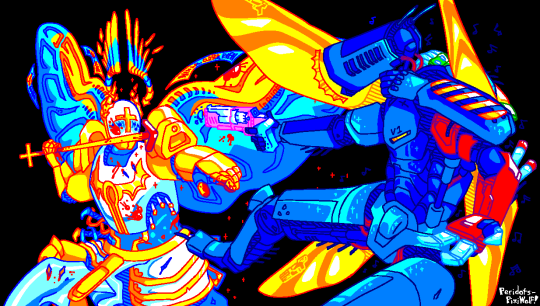
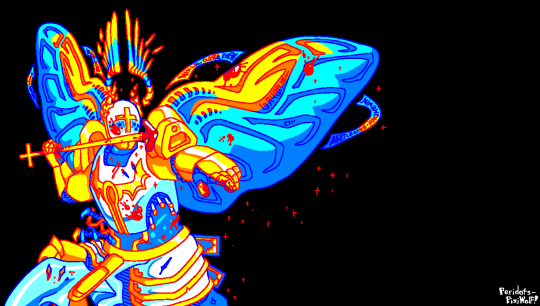
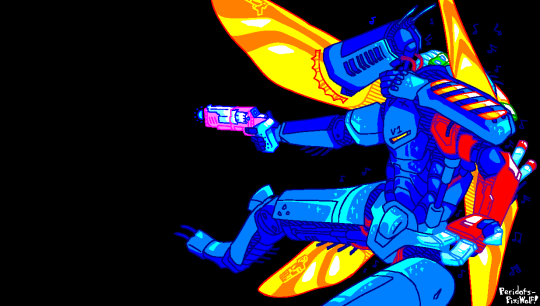
additionally once again: special thanks to @magnumopos and @muzzleroars , neither of which I have actually spoken to in my life but both of which are credited with partially inspiring this! (dedicated section under the readmore due to the fact I do not generally tag people at all ever and wasn't sure if I should, but thought it was worth mentioning!) The former for giving me the wonderful idea of dragonfly V1, the latter for drawing V1 like a strange little creature + for the feedbacker plate, I enjoy both your works :]
(retroactively, on march 27th of 2024, assigning them a full bingo with credit to deep-space-lines. ehehehehe)
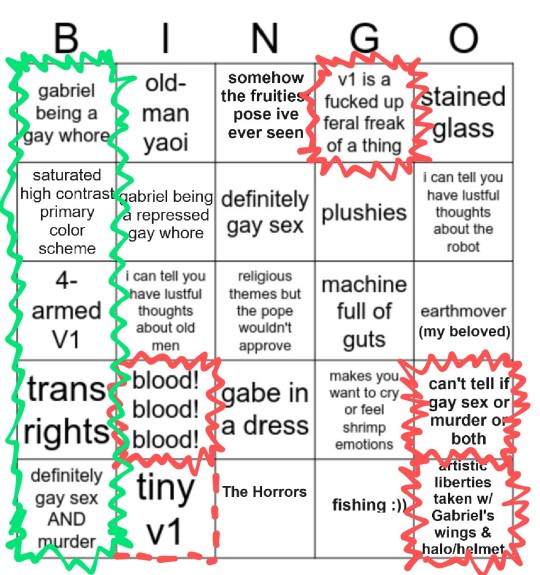
#peridots-art#gabriel ultrakill#v1 ultrakill#ultrakill#bots#bugs#drawing them more buggish now... i have a whole chart listing uk characters as bugs and it's so fun#v1 is dragonflyish for many reasons and gabriel (+ council)'s heavily bee-coded but I like drawing him more beetlelike. anyway#eyestrain#blood#gabv1el#< yes gabe's wholeheartedly trying to kill v1 and v1's actively harming him. yes this is ship art. they're having fun#not a thing that I feel I really need to clarify when it comes to ultrakill i just thought it was funny#anyway. yes yes more ultrabright ecstasy-winged gabriel with blood all over him. as to be expected of my ultrakill fanart. however#this obviously isn't my usual style but it WAS pretty fun to draw. i wanted to draw something chaotic and abnormal anyway for this#i kind of wanted it to be a successor to the nov29 gabe post and to mess around with it so. task completed 👍#there definitely was more i wanted to say here (besides clarifying it's been a year since the act 2 release + that means a lot to me)#but i can't think of anything else so woe! bugs be upon ye#actually aug22 addition: if this inspires your own uk art in any way shape or form. PLEASE tag me in it :]
854 notes
·
View notes
Text
I hate, hate golden trio bashing fics. They have such a ride-and-die friendship like bro they raided a bank together then fled on a dragon they stuck together through so much — while having fights like normal friends do, but the best thing about them? They get back together. No matter what. Thus, coming out of a literal war in one piece, together; if that doesn't tell you how much they love each other then I don't know what to tell you.
#they would die for each other#they are so damn loyal to each other that it's kind of scary#and it is valid imo#like i wouldn't be surprised if they come out of the war being codependent#honestly that would be least of their worries#golden trio#hermione granger#harry potter#ron weasley#harry james potter#i can list all the things they did for each other and i will one#ill make a post on how they fucking complete each other#because they do#one isnt better than each other#they are better#and they are happier together#u dont gotta compare#the golden trio
265 notes
·
View notes